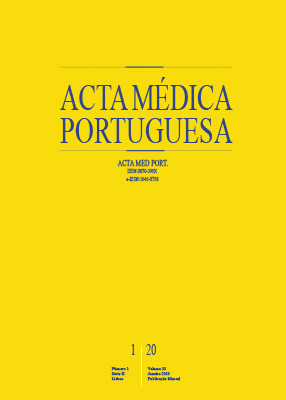Neuropsychological Profile, Cognitive Reserve and Emotional Distress in a Portuguese Sample of Severely Obese Patients
DOI:
https://doi.org/10.20344/amp.12233Keywords:
Emotions, Executive Function, Cognition, Cognitive Reserve, Obesity, Morbid/psychology, PortugalAbstract
Introduction: Obesity is a significant risk factor for multiple comorbidities, and its relation to neurocognitive disfunction is particularly important in cognitive decline, especially in middle age. Due to their impact on neurodegeneration, we sought to explore neuropsychological profile, cognitive reserve and emotional distress in patients with severe obesity.
Material and Methods: We used a sociodemographic and clinical questionnaire, neuropsychological tests and a symptom self-reported scale of emotional distress. We evaluated the cognitive performance of 120 patients, aged between 18 and 65 years, in treatment for their severe obesity in Portugal, between May 2012 and December 2015.
Results: Cognitive performance was below the mean for the Portuguese population, for immediate recall, visuoperception, resistance to interference and cognitive flexibility. Cognitive reserve was mostly low, especially in the older groups and groups with low professional status and increased associated with better cognitive outcomes. Emotional distress was shown to be higher in our sample compared with a normative sample. The risk factors evaluated were important in the worsening of cognitive functions. Cognitive performance decreased with age.
Discussion: Severe obesity was associated with a poorer cognitive performance of the sample. The cognitive reserve was greater in the younger groups. There was a significant presence of emotional distress, especially among women.
Conclusion: Severe obesity is associated with an impairment in cognitive and emotional performance, aggravated by aging, cognitive reserve, and comorbidity. This study emphasizes the need for preventive actions, such as neuropsychological screening, in the detection of changes and the design of better interventions.
Downloads
Downloads
Published
How to Cite
Issue
Section
License
All the articles published in the AMP are open access and comply with the requirements of funding agencies or academic institutions. The AMP is governed by the terms of the Creative Commons ‘Attribution – Non-Commercial Use - (CC-BY-NC)’ license, regarding the use by third parties.
It is the author’s responsibility to obtain approval for the reproduction of figures, tables, etc. from other publications.
Upon acceptance of an article for publication, the authors will be asked to complete the ICMJE “Copyright Liability and Copyright Sharing Statement “(http://www.actamedicaportuguesa.com/info/AMP-NormasPublicacao.pdf) and the “Declaration of Potential Conflicts of Interest” (http:// www.icmje.org/conflicts-of-interest). An e-mail will be sent to the corresponding author to acknowledge receipt of the manuscript.
After publication, the authors are authorised to make their articles available in repositories of their institutions of origin, as long as they always mention where they were published and according to the Creative Commons license.









